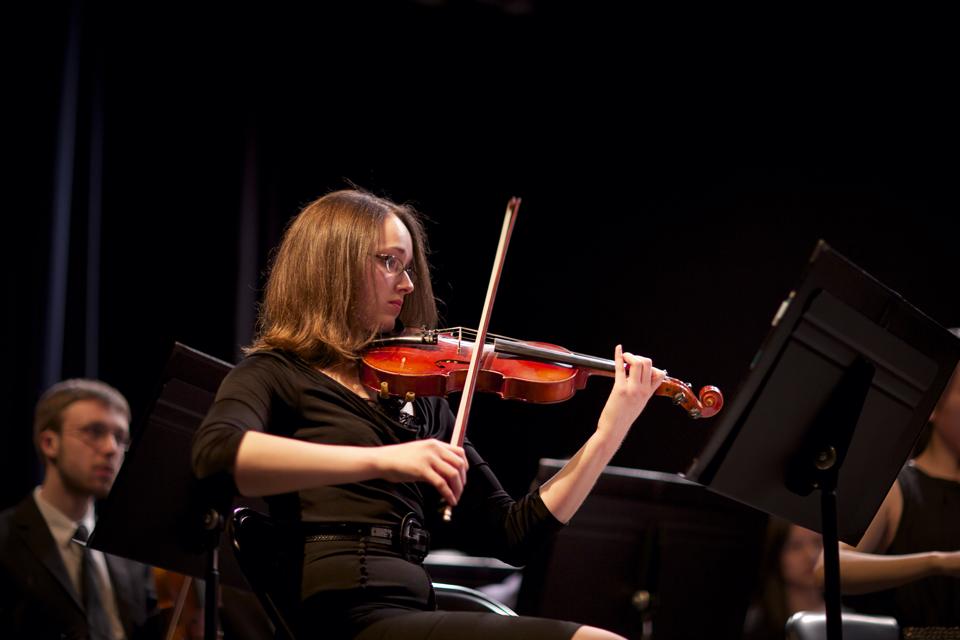Mary Stack is a 23-year-old biomedical engineering major who is originally from East Longmeadow, Massachusetts. She is a member of Alpha Eta Mu Beta, the Biomedical Engineering Honor Society, and she conducts polymer research to help aid in bone regrowth. In addition to pursuing her love of engineering, Stack is a violinist and is the Concertmistress in the Stevens Orchestra. She also enjoys singing and playing guitar in her free time.
At the young age of three or four, Stack attended a Musical Petting Zoo, where she got to play a variety of instruments. After fiddling around with a full-sized violin, Stack became interested in the instrument. Later at the age of eight, she began taking music lessons.
Stack knew that she wanted to pursue a degree in something that could help others. When she was younger, Stack was in Girl Scouts and through that, she attended “Engineering Exploration Day,” an event at a local college. After attending the event, Stack knew that she wanted to become an engineer.
In addition, to her discovering her engineering pursuits at a young age, Stack was surrounded by music early in her life. Stack comes from a musical family: her dad played the drums and whistled, and her mom went to college to become an opera singer. When Stack was little, she and her mom would play “Guess the Composer” on the radio. “She would usually win,” admitted Stack.
“Bach is beautiful,” Stack said. “He is one of my favorite solo violin composers.” For orchestra, Stack enjoys the works of Rachmaninoff and Shostakovich because of their heavy and mournful music. “It is intense,” she admits, “[and it] is not the kind of music you listen to when doing homework!” added Stack. Although Stack oftentimes cannot listen to violin music when doing work, she concedes that Mozart is “good background music.”
“I’m not a huge Mozart fan,” Stack said.
For Stack, music is not only a temporary escape from schoolwork — it is also a challenge. In addition to playing orchestra and chamber music, Stack enjoys playing solo violin music, especially Bach, Sonatas, and Partitas. Those pieces have a lot of double-stops, which are “very difficult,” Stack said. There was one piece in particular that she really wanted to play growing up, so she took it to her violin teacher, after having worked through the piece on her own a bit. Her teacher told her that the piece would be too difficult for her to play, but Stack did not let that change her mind about playing the piece.Mary played what she had worked on so far for her teacher, and he agreed to work on it with her. Similar to engineering and the challenges of conducting research, some things do not work out the way one expects them to. Despite the setbacks, one can work through the hardships, whether that be a tricky musical passage or a difficult laboratory experiment.
Stack played what she had worked on so far for her teacher, and he agreed to work on it with her. Similar to engineering and the challenges of conducting research, some things do not work out the way one expects them to. Despite the setbacks, one can work through the hardships, whether that be a tricky musical passage or a difficult laboratory experiment.
At a tech. school, it can be difficult to balance academics and music. Stack tries to practice every day, even if it just be twenty minutes. She also listens to music constantly, and she writes her own music sometimes. Stack’s sister makes a lot of YouTube videos and sometimes the two collaborate and do songs together.
Stack emphasizes how easy it is to get involved with the performing arts on campus. One of the ways to get involved is to join a group, whether that be the Band, Orchestra, or Quackapella. “Find people who all want to play music together,” Stack said. “It’s fun to do it—even if you don’t plan to perform it,” she adds. Stack compares practicing an instrument to going to the gym: “I won’t go if I have to go by myself!”
